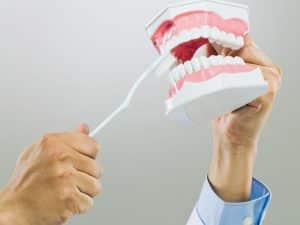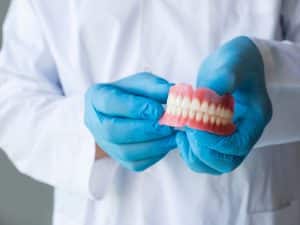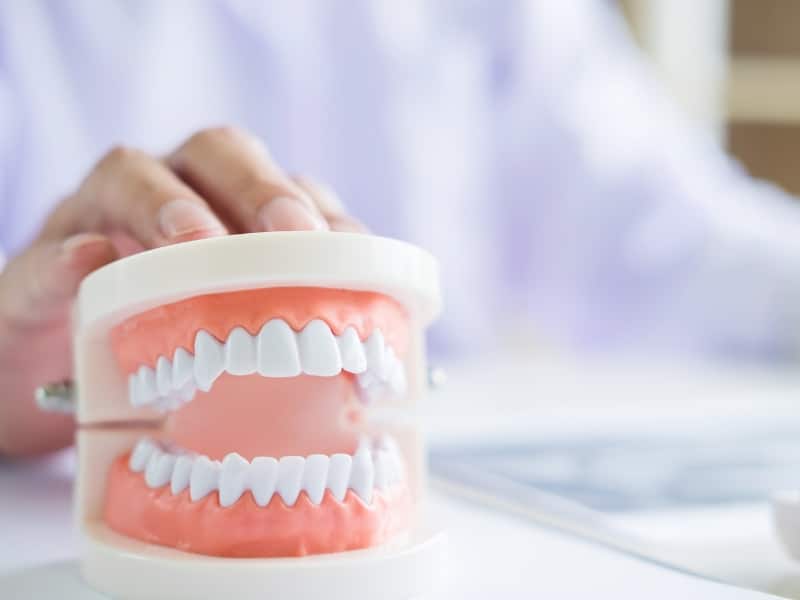Dentures can significantly improve the quality of life for individuals who need to replace missing teeth. However, wearing dentures can sometimes cause discomfort, making it difficult to fully enjoy your day-to-day activities. Understanding the reasons behind denture discomfort is crucial for alleviating pain and ensuring that your dentures fit properly. This article explores the common causes of denture discomfort and offers solutions to help you manage and prevent these issues.
Why does denture discomfort happen?
Denture discomfort can occur for a variety of reasons. If you’re feeling pain or discomfort when wearing your dentures, it’s important to identify the cause so you can take appropriate action. Some common factors include:
- Improper fit: One of the main reasons for denture discomfort is a poor fit. Dentures should fit snugly against your gums to avoid irritation or slipping.
- Gum irritation: If your dentures are rubbing against the gums, it can cause soreness and irritation.
- Bone changes: Over time, your jawbone may shrink or change shape, causing your dentures to feel uncomfortable.
- Food particles: Sometimes, food debris can get trapped under your dentures, leading to discomfort.
- Allergic reactions: Allergies to the materials used in dentures can also lead to discomfort.
Understanding these common causes will help you take the right steps to relieve pain and prevent it from happening in the future.
Could poor fit be the reason for your denture discomfort?
A poor fit is one of the most common reasons for denture discomfort. If your dentures don’t sit properly in your mouth, they can cause pain and irritation. Poorly fitted dentures may shift, rub, or even cause sores in your mouth. Factors that contribute to an improper fit include:
- Changes in your gums: Your gums naturally change shape over time, which can cause your dentures to no longer fit correctly.
- Old dentures: If your dentures are old or have been used for an extended period, they may have worn down or changed shape.
- Improper measurements: If your dentures were not made with precise measurements, they might not fit comfortably.
Regular check-ups with your dentist can help ensure your dentures are properly fitted. If your dentures feel loose or uncomfortable, don’t hesitate to schedule an appointment to get them adjusted.
Is gum irritation making it difficult to wear your dentures?
Gum irritation is another common cause of denture discomfort. If your dentures are not properly aligned or are rubbing against your gums, it can lead to soreness and tenderness. There are a few key reasons why this may happen:
- New dentures: It may take some time for your gums to get used to the new dentures when you first begin wearing them. It’s normal to experience some discomfort during this period. Also, many people wonder if there is pain after getting dentures. While discomfort is common during adjustment, it should subside with proper care and adjustments.
- Poor cleaning: Failing to clean your dentures properly can cause plaque and bacteria to build up, leading to gum irritation.
- Infections: Sometimes, untreated gum irritation can lead to infections, exacerbating discomfort.
- Overuse of denture adhesive: Using too much denture adhesive can cause a build-up of pressure on your gums, leading to soreness.
If you experience gum irritation, try adjusting your dentures for a better fit, ensure that they’re cleaned thoroughly, and avoid using excessive adhesive. If the discomfort persists, it’s best to consult your dentist for advice.
How does bone loss contribute to denture discomfort?
Bone loss is a significant factor in denture discomfort. Over time, the jawbone may shrink or change shape, especially if you’ve had missing teeth for a while. This can result in dentures that no longer fit well, leading to pain and difficulty wearing them. The following factors contribute to discomfort caused by bone loss:
- Jawbone resorption: After tooth loss, the jawbone may shrink in the area where the teeth were once located. This can lead to a loss of support for your dentures.
- Changes in bite alignment: As your bone structure changes, it can affect how your dentures sit and function in your mouth.
- Loose dentures: Bone loss can cause dentures to become loose, making them uncomfortable and prone to slipping.
If you suspect that bone loss is affecting the fit of your dentures, your dentist may recommend options like bone grafting or implant-supported dentures to help improve the fit and comfort.
Could allergies or sensitivities be causing discomfort?
Allergies or sensitivities to the materials used in dentures can cause discomfort. Some people are allergic to acrylic, metal, or other substances from which dentures are made. Symptoms of an allergic reaction include:
- Swelling: Allergies can cause swelling of the gums or mouth tissues, leading to discomfort.
- Itching or burning sensations: These sensations can occur if you’re sensitive to the materials used in your dentures.
- Discolouration or sores: An allergic reaction can sometimes result in sores or discolouration on the gums or inside the mouth.
If you suspect an allergy or sensitivity to your dentures, speak with your dentist. They may recommend switching to materials that are more suitable for your needs, such as hypoallergenic dentures or those made from more biocompatible materials.
Are you maintaining your dentures properly?
Proper denture maintenance is essential for preventing discomfort. If you’re not cleaning your dentures regularly, they can become a breeding ground for bacteria, leading to gum irritation and even infection. Some common maintenance mistakes include:

- Not cleaning dentures daily: Failing to clean your dentures regularly can lead to plaque build-up and discomfort.
- Using the wrong cleaning products: Harsh cleaning products can damage dentures and cause irritation to your gums.
- Storing dentures improperly: Leaving dentures in dry conditions can cause them to warp, resulting in discomfort when worn.
To keep your dentures in good condition, use a mild denture cleaner daily and store them in a damp container when not in use. Additionally, regular visits to your dentist can help keep your dentures in optimal condition.
Beyond denture care, it’s also important to consider your overall oral health. Certain factors can increase the risk of oral diseases, including oral cancer. While dentures play a crucial role in maintaining oral health, it’s essential to be aware of the risk factors for developing oral cancer, such as smoking, excessive alcohol consumption, and a history of HPV infection, which can all affect the health of your mouth.
When should you seek professional help for denture discomfort?
While some discomfort is normal when first wearing dentures, persistent or severe pain should never be ignored. You should seek professional help if:
- Pain doesn’t subside: If your dentures feel loose, cause persistent pain, or make it difficult to eat and speak, it may be time for a professional assessment. In some cases, adjustments can help, but if the discomfort continues, you may need new dentures to restore comfort and functionality.
- Sores or infections develop: If you notice sores, swelling, or signs of infection, it’s important to consult your dentist as soon as possible.
- Difficulty chewing or speaking: If you experience difficulty chewing or speaking, your dentures may need adjustment.
- Loose dentures: If your dentures feel loose or fall out frequently, it’s time to see a dentist for re-fitting.
Your dentist can assess your dentures and recommend the best action to ensure comfort and proper function.
Get comfortable, well-fitted dentures at Marsfield Dental Care
If you’re experiencing discomfort with your dentures, don’t wait for it to worsen. At Marsfield Dental Care, we offer a comprehensive range of denture services, including new dentures and professional denture repairs. Our experienced team is dedicated to providing gentle, thorough care while ensuring you feel comfortable and well-informed every step of the way.

Patients appreciate our friendly staff and the stress-free experience we provide—from smooth appointments to easy private health fund claims. If you’re looking for a trusted dental practice that prioritises your comfort and dental health, schedule an appointment with Marsfield Dental Care and experience the difference for yourself!
Frequently Asked Questions (FAQ)
- How long does it take to adjust to wearing dentures?
Your gums typically adjust to the new dentures in a few weeks, but the process can vary depending on the individual.
- Can I sleep with my dentures in?
Removing dentures at night is generally recommended to allow your gums to rest and prevent irritation.
- How often should I get my dentures checked?
It’s a good idea to visit your dentist every 6 to 12 months to ensure your dentures fit properly and are in good condition.
- Why do my dentures feel loose after a few months?
Over time, your jawbone and gums may shrink, causing your dentures to feel loose. Regular check-ups can help address this issue.
- Can I use regular toothpaste to clean my dentures?
No, it’s best to use a denture-specific cleaner to avoid damaging the surface of your dentures.
- Are there any foods I should avoid with dentures?
Sticky or hard foods can damage dentures or cause them to become dislodged, so it’s best to avoid these.
- Can dentures cause bad breath?
If dentures are not cleaned properly, bacteria and food particles can accumulate, leading to bad breath.
- How can I prevent my dentures from slipping?
Ensure that your dentures fit properly, and consider using a denture adhesive if needed.
- Are there any non-allergic alternatives for dentures?
Yes, some denture materials are hypoallergenic and can be used for individuals with sensitivities.
- What should I do if my dentures are causing pain?
Contact your dentist immediately if you experience persistent pain or discomfort, as adjustments may be needed.

